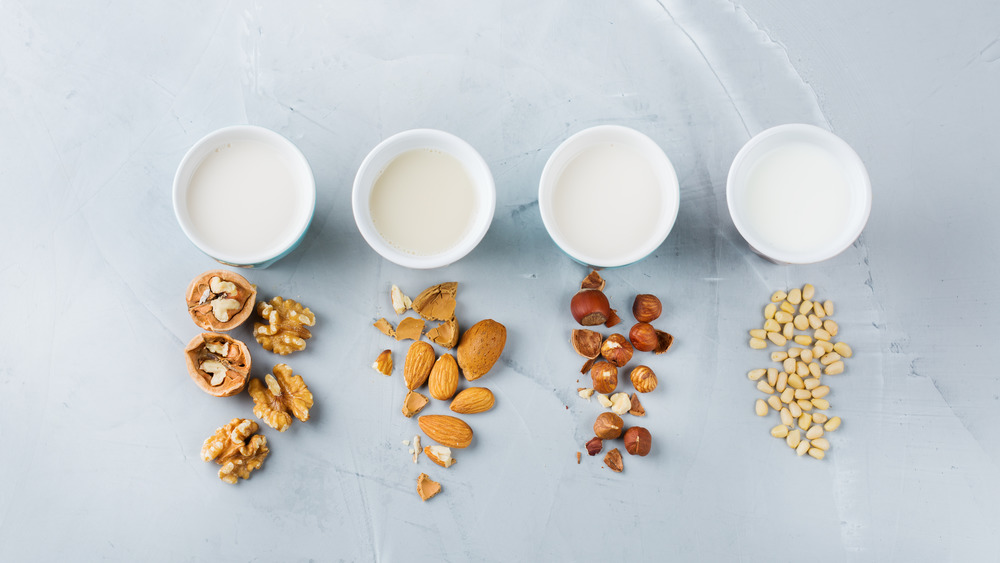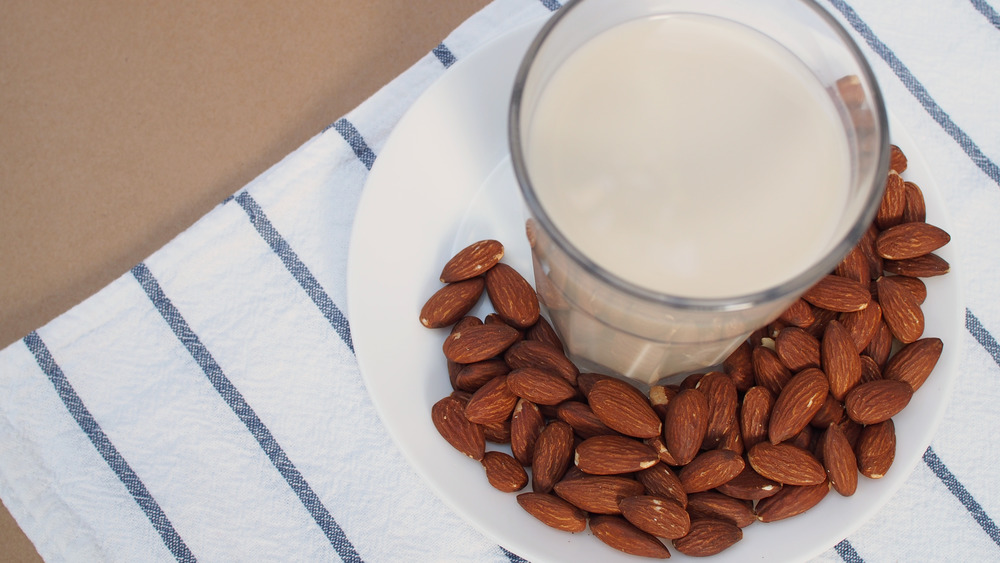Almond Milk Vs Pistachio Milk: Which Is More Nutritious?
We're all looking for easy ways to be a little healthier, which might have something to do with the ever-growing market for non-dairy milk alternatives. Whether you're lactose intolerant, vegan, or just trying to be more health and environmentally conscious, there's probably a plant based milk for you. These alternative milks range from the more traditional rice and soy milks to the newer hemp, banana, coconut and even pea milks. But, perhaps the most common are nut milks that are made from almonds, cashews, hazelnuts, walnuts, and, more recently, pistachios (via Outside).
Unfortunately, while these milks are marketed as a healthier alternative to the dairy version, they might not be as nutritious as you think. In fact, almond milk's booming popularity in the past few years has led to revelations that the product is not only environmentally unfriendly, but also nutritionally lacking due to the low-density of nuts in the final product (via Mic). So is the new nut milk on the scene, pistachio milk, any better for you?
The truth about almond milk
If you're a fan of almond milk, there's good news and bad. First, you should know that not all nut milks are created equal. For instance a 2015 lawsuit accused the brand Almond Breeze of containing only about two percent almonds (with the rest being water, sugar, and additives to give the drink a milky taste and texture) (via Mother Jones). Other brands can contain as much as 14 percent almonds, according to Choice. In either case, you're getting far less nutrients from milked almonds than you would from whole almonds or from dairy milk.
Luckily, many brands are working to solve this issue by fortifying their almond milk products with supplementary nutrients so you wind up getting more than just the flavor and fat of the nuts and a good amount of vitamin E (via Healthline). Of course, as most vegetarians and vegans already know, there are some nutrients in dairy milk that just can't be found in plants, like vitamin B12, so you shouldn't be expecting your non-dairy milk to be as nutrient-dense as the dairy stuff (via Vox). To find the healthiest almond milk option, look out for unsweetened, carrageenan-free versions that have been fortified with calcium and vitamins A and D (via Eat This, Not That).
The truth about pistachio milk
Pistachio milk might sound like just the latest trendy drink, but for some it's much more. For instance, Well+Good writer Emily Laurence, who admitted to experiencing "alternative milk fatigue" called it "one of the most delicious, dessert-like alternative milks I've tasted." But how does it stack up to almond milk in terms of nutrients?
According to Kale.World, the macronutrients of the two drinks are pretty similar: they have about same amount of carbohydrates, similar amounts of fiber, fat and protein. However, when it comes to vitamin density, the two milks diverge. Almond milk offers much more vitamin E than pistachio and it's a better source of potassium, calcium, magnesium, phosphorus and iron. Pistachio milk, on the other hand, contains a good amount of thiamin (or vitamin B1), phosphorus, iron, and very high levels of vitamin B6 (not present in almond milk). Pistachio milk also contains manganese and copper not found in almond milk, but overall it lags behind almond milk in terms of nutrient density. So, if you're looking to maximize your nut milk nutrients, a vitamin-fortified almond milk is the way to go. Luckily, you don't have to choose just one.


